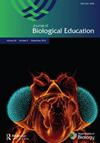咳嗽、打喷嚏、传播——新冠肺炎疫情后小学生对传染病的认识
IF 1
4区 教育学
Q3 BIOLOGY
引用次数: 0
摘要
新冠肺炎大流行对世界各地的社区产生了巨大影响。我们知道,未来将出现新的易流行疾病。因此,重要的是调查当前的疫情对学童对传染病的理解产生了什么影响,以便在这种新的理解的基础上发展生物学教育。本研究的目的是探索瑞典中学(10-12岁)学生对传染病的理解及其感知的知识来源。数据是通过对15名学生的个人半结构化访谈收集的,并通过主题编码进行分析。结果显示,疫情对受访者的观念产生了很大影响。首先,他们基于新冠肺炎概念的传染病概念是难以捉摸的,因为新冠肺炎可能表现得非常不同。其次,人们认识到需要关心自己和他人。第三,疫苗的重要性得到了承认,但疫苗被赋予了不同的作用。最后,他们对感染的理解似乎源于新闻和互联网等非正式领域,而不是生物学教育。生物学教学的一个建议是尽早引入科学概念,更多地关注传染病之间的异同,并与其他学校科目合作。©2023作者。由Informa UK Limited出版,交易名称为Taylor&Francis Group。本文章由计算机程序翻译,如有差异,请以英文原文为准。
Cough, sneeze, pass it on – pupils’ understanding of infectious diseases in the aftermath of COVID-19
The COVID-19 pandemic had an immense impact on communities around the world. We know that new epidemic-prone diseases will emerge in the future. Consequently, it is important to investigate what impact the current pandemic had on school children's understanding of infectious diseases in order to develop biology education based on that novel understanding. The aim of this study was to explore Swedish middle school (10-12-year-old) pupils' understanding of infectious diseases and their perceived sources of knowledge. Data was collected through individual semi-structured interviews with fifteen pupils and analysed by thematic coding. Results revealed a great impact of the pandemic on the respondents' conceptions. Firstly, their notion of infectious diseases based on their idea of COVID-19 was elusive because COVID-19 can manifest very differently. Secondly, the need to care about oneself and others was recognized. Thirdly, the importance of vaccines was recognized, but vaccines were given different roles. Finally, their understanding of infection seems to originate from informal domains such as the news and the Internet, rather than from biology education. One proposal for biology teaching could be to introduce scientific concepts earlier, to pay more attention to differences and similarities between infectious diseases, and to cooperate with other school subjects. © 2023 The Author(s). Published by Informa UK Limited, trading as Taylor & Francis Group.
求助全文
通过发布文献求助,成功后即可免费获取论文全文。
去求助
来源期刊
CiteScore
3.00
自引率
27.30%
发文量
68
审稿时长
>12 weeks
期刊介绍:
Journal of Biological Education is firmly established as the authoritative voice in the world of biological education.
The journal aims to bridge the gap between research and practice, providing information, ideas and opinion, in addition to critical examinations of advances in biology research and teaching. Through the coverage of policy and curriculum developments, the latest results of research into the teaching, learning and assessment of biology are brought to the fore.
Special emphasis is placed on research relevant to educational practice, guided by educational realities in systems, schools, colleges and universities. Papers that are theoretically informed and methodologically rigorous are welcomed.

 求助内容:
求助内容: 应助结果提醒方式:
应助结果提醒方式:


